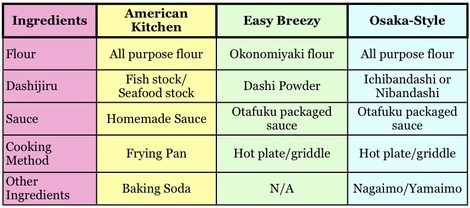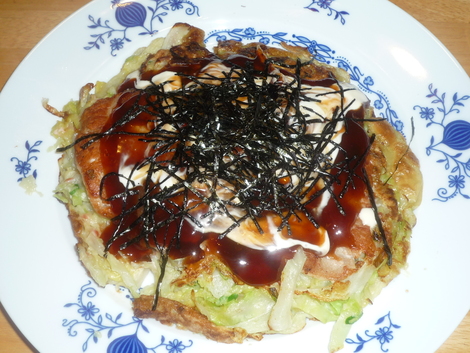The is the fourth post and the third okonomiyaki recipe in a four-part Osaka-style okonomiyaki posting. See Classic Osaka-style Okonomiyaki for the first post and Okonomiyaki Equipment for the second post and See Okonomiyaki (Easy Breezy) for the third post.
I wanted to come up with a recipe that could easily be made with ingredients from a typical American grocery store. Therefore, katsuobushi (dried bonito flakes) are not a part of this recipe but if you can find it, it will make a big difference since it’s used as the stock and one of the topping items.
Okonomiyaki is one of those Japanese dishes that is slowly growing in popularity and I think it should be accessible to everyone. So here’s my best attempt at substitution but if you have a Japanese market nearby, please follow the Classic Osaka-style recipe.
The chart below summarizes the major differences between the types of Okonomiyaki I am posting:
Osaka-style Okonomiyaki for the American Kitchen (Buta tama) Ingredients (Servings 1)
150 grams of cabbage
1/4 cup of chopped green onions
1/2 tsp. baking soda
1 egg
50 grams of all purpose flour
100 ml of any seafood stock. (Shrimp stock or any fish stock will do.)
1.5-2 slices of good bacon
Okonomiyaki Sauce Ingredients
1.5 tbsp. ketchup
1.5 tbsp. tonkatsu sauce (You can find tonkatsu sauce in the Asian food aisle)
1.5 tbsp. honey
1 tsp. of oyster sauce (Also on the Asian aisle)
*Combine all ingredients in a bowl and mix well.
Toppings
1/2 a sheet of Nori (This is a substitute for aonori which is a type of seaweed. Most grocery stores carry regular sushi style seaweed. Cut the seaweed into small pieces using kitchen sheers. See photo below.)
Okonomiyaki Sauce (See recipe above)
2 tbsp. mayonnaise
Equipment
1) Frying pan.
2) Spatulas
Directions
1) Make the fish stock/seafood stock (shrimp stock will be nice). Seafood stock takes a lot of time so prepare in advance. You can also substitute with canned or boxed stock.
2) Measure the stock and egg and add to a mixing bowl. Make sure the stock or stock is cooled so it doesn’t cook the egg.
3) Sift the flour directly into the bowl and add the baking powder.
4) Chop the cabbage into 1/8 of an inch slices. The thickness of the cabbage is important for the cooking time I have here. It shouldn’t be too thick or paper thin so that it cooks just right. Tip: remove the core before slicing so that you don’t end up with tough pieces in the okonomiyaki. Toss the cabbage into the bowl.
5) Chop the green onions finely and add them to the bowl. At this point add in any other ingredients that you like such as shrimp, squid, oysters, beef, etc.
6) Mix lightly until combined but don’t over mix. This helps to keep it light and fluffy.
7) Heat your frying pan to medium.
8) Lay the bacon on the pan and immediately top it with the cabbage and form a round circle.
9) Allow it to cook for 4-5 minutes or until golden brown and then flip using two spatulas.
10) Cover and continue to cook for 3-5 more minutes and turn up the heat slightly to medium-high.
** If you decide to add other ingredients in step 5, you may want to increase the cooking time and keep it on medium so that the ingredients cook inside.
11) Top with okononiyaki sauce, aonori, mayo!
Add the egg and stock to a measuring cup. It shouldn’t exceed 2/3 cup or should be 150ml. Make sure the stock is cooled so it doesn’t cook the egg.
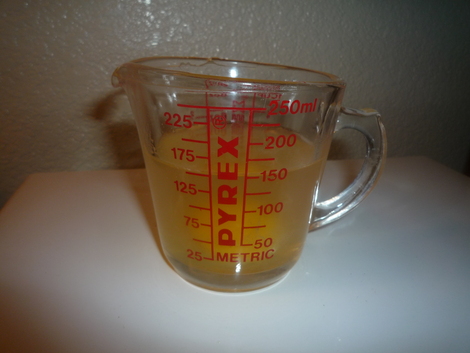
Slice the cabbage in 1/8 inch slices. Remove the core before slicing.
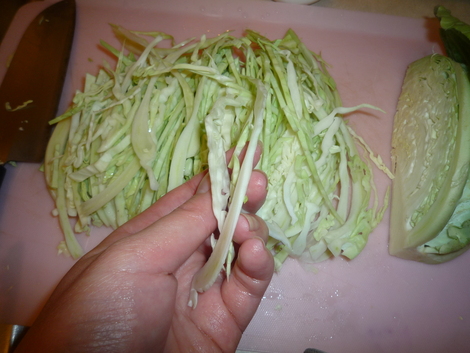
Add the stock-egg mix and sift the flour directly into a mixing bowl. Don’t forget the baking soda.
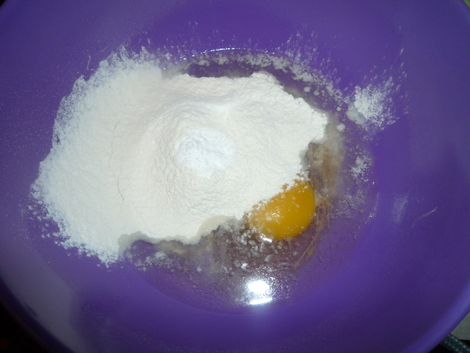
Add the cabbage, green onions and any other “gu” ingredients that you would like to add. See the Fugetsu menu link for ideas.
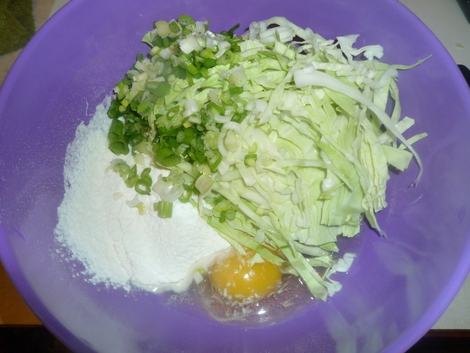
Mix lightly until ingredients are combined to keep it light and fluffy.
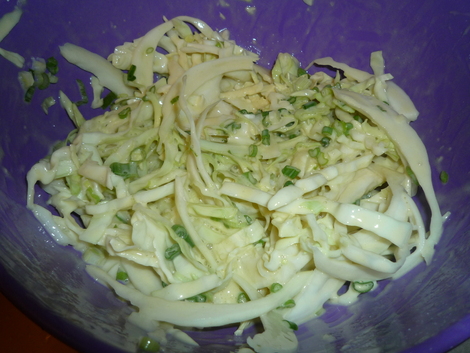
Add the bacon to the frying pan and immediately (before the bacon starts to curl) add the okonomiyaki mix on top.
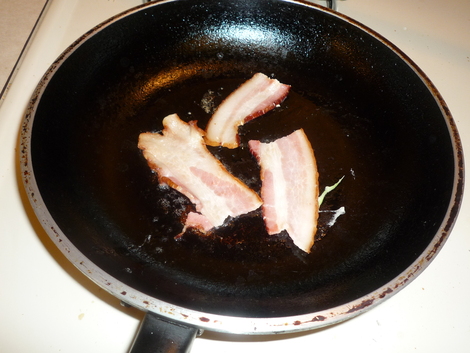
Fry on medium heat for 4-5 minutes or until golden brown.
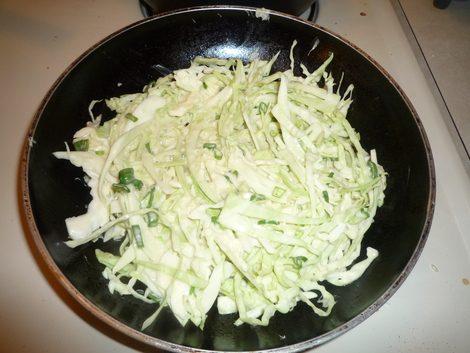
Flip, cover and increase the temp to medium high and cook for 3-5 more minutes or longer if you add extra ingredients in step 5.
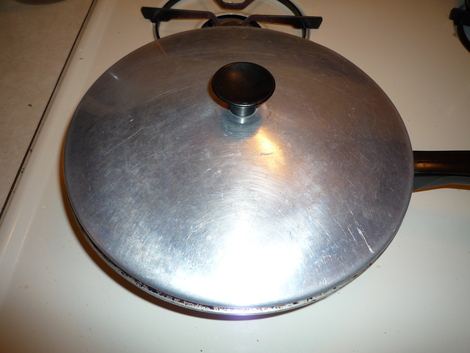
Combine the okonomiyaki ingredients above into a bowl and mix.
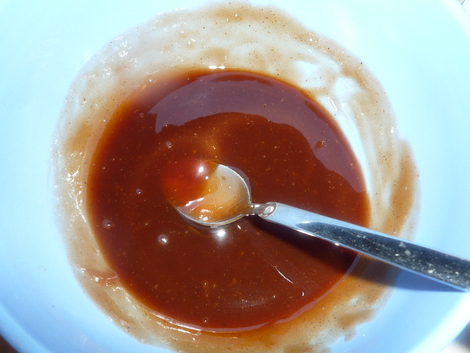
Fold half of a nori sheet into 4 even pieces and cut into thin slivers.
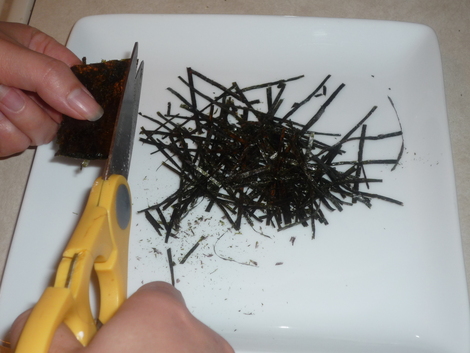
Serve it up with finely cut seaweed, mayo and okonomiyaki sauce.
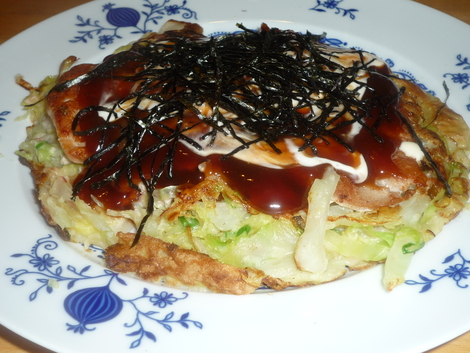

Naomi Kuwabara was born and raised in California but spent many summers in Japan growing up. She has spent time living in Hokkaido and Osaka, both meccas for Japanese cuisine. Her passion is cooking and sharing her experiences cooking Japanese food with others. Her blog Umamitopia is about her experiences cooking Japanese food. Her greatest inspirations are from her mother and grandmother. Her cooking adventures can be found at http://umamitopia.com.

